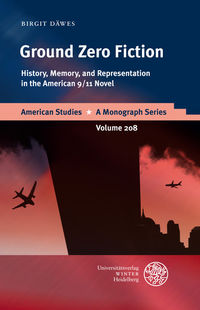
Ground Zero Fiction
History, Memory, and Representation in the American 9/11 Novel
1. Auflage, 2011
497 Seiten
ISBN: 978-3-8253-5930-0
Sortiment: Buch
Ausgabe: Gebunden
Fachgebiet: Anglistik/Amerikanistik
Reihe: American Studies – A Monograph Series, Band: 208
lieferbar: 12.09.2011
Schlagwörter:
historischer Roman, Symbolik, historische /11. September, Narrative und Gegennarrative, historische (Gegen-)Narrative, Subgenre /Ground Zero Fiction, kollektive Erinnerung, Traumaliteratur, New York (i. d. Literatur), Powers, Richard, Foer, Jonathan Safran, Updike, John, DeLillo, Don, 11. September 2001, Gegenwartsliteratur /U.S.A., Gedächtniskultur, 9/11 (Nine Eleven)
A decade after the terrorist attacks of September 11, 2001, over 160 novels by U.S.-American writers have re-enacted or revised the day we now call ‘9/11’. This study systematically charts the rich subgenre of Ground Zero Fiction by exploring its formal, structural, thematic, and functional dimensions. In a combination of typological survey and detailed analysis, both familiar texts (by Jonathan Safran Foer, Don DeLillo, or John Updike) and lesser-known approaches (by writers such as Karen Kingsbury, Laila Halaby, Nicholas Rinaldi, Helen Schulman, or Ronald Sukenick) are investigated for their specific engagements with contemporary history. The American 9/11 novel, this volume argues, not only provides a productive testing ground for narrative crisis management, but it serves as an exemplary twenty-first century interface between historical and fictional representation, between ethical and aesthetic responsibilities, and between national and transnational formations of identity.
""
Thomas Ærvold Bjerre in: American Studies in Scandinavia, 44.2 (2012), 140-143
""
Greg Wersching in: Journal of American Studies, 46.3 (2012), E58
""
Birte Otten in: Zeitschrift für Anglistik und Amerikanistik, Vol. 61.1 (2013), 102ff
""
Katharina Donn in: Anglia, Bd. 130 (2012), Heft 4, 583ff
""
Sien Uytterschout in: Amerikastudien / American Studies, 57, 1 (2012), 145ff
""
Marek Paryż in: Polish Journal for American Studies, Vol. 6 (2012), 130ff
""
Anneka Esch-van Kan in: KULT_online, 32 (2012) [http://kult-online.uni-giessen.de/wps/pgn/home/KULT_online/32-6]
""
David Simpson in: Modern Language Quarterly, 73.2 (2012), 251ff




